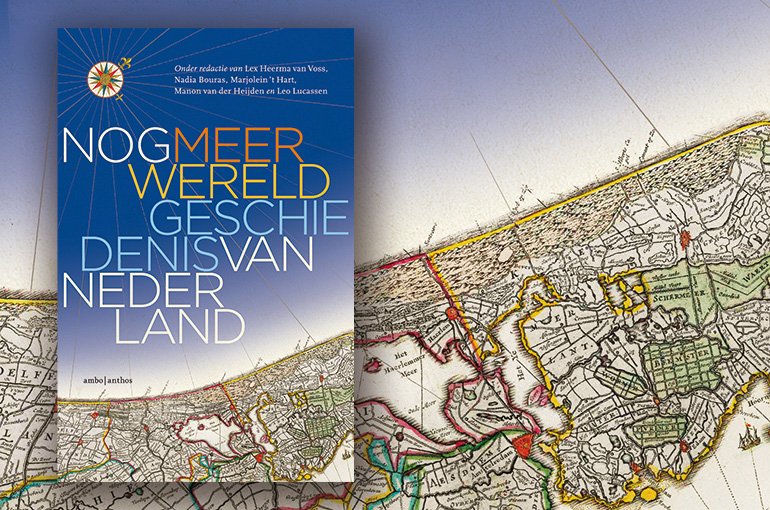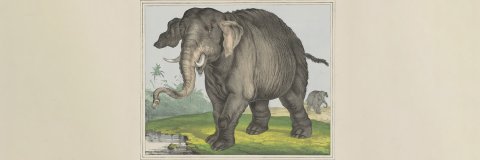Over twenty UU historians contributed to this extensive new publication
‘Nog meer wereldgeschiedenis van Nederland’

In total, more than a hundred authors contributed to ‘Nog meer wereldgeschiedenis van Nederland’ (‘Even More Global History of the Netherlands’), editor Professor of Social and Economic History Lex Heerma van Voss says. 21 of them are affiliated to the Department of History and Art History at Utrecht University. In the 720-page book, the historians consider Dutch history from a global perspective.
Dutch history, from a new angle
‘Nog meer wereldgeschiedenis van Nederland’ is the successor to ‘De wereldgeschiedenis van Nederland’ (‘The Global History of the Netherlands’), a highly successful standard work published in 2018. “The idea was copied from a French example,” Lex Heerma van Voss explains. “Like the French, we noticed that the field of history has become increasingly international in recent years.”

As the title reveals, the international perspective is the ambition of the newly published book. It aims to provide the history of the Netherlands with a broader, global context. “For us as researchers, such a perspective gives new, surprising insights and we would like to share that with a wider audience.”
Follow-up to ‘De wereldgeschiedenis van Nederland’
What started with a call for papers in late summer of 2017, resulted in some 150 proposals in no time, Heerma van Voss says. “So when ‘De wereldgeschiedenis van Nederland’ was published, we already knew there would be plenty more interesting topics. The book proved a success and the publisher approached us quite soon with the proposal to elicit even more contributions from historians.”
Like the first volume, ‘Nog meer wereldgeschiedenis van Nederland’ features a mixture of contributions from established and new authors. “The publisher wanted more contributions from well-known historians, but as editors we are actually happy with it as it is.”
In our opinion, there was a disturbing omission in volume 1
“In our opinion, there was one disturbing omission: volume 1 did not contain a contribution on the Holocaust, which clearly has international dimensions,” Heerma van Voss says. “We are therefore pleased we now have an excellent contribution on the Shoah by Ido de Haan.”
Non-Dutch authors
One criticism of the first volume was that while it included contributions on interactions between the Dutch and others, they had never been written by representatives of that other group. “For the second volume, we made a serious attempt to find more foreign authors,” Heerma van Voss stresses.
With varying success. “We probably could have done more, but I think the reason is also that what is seen as a surprising and important interaction from a Dutch perspective is by no means always the same for non-Dutch historians.”
An an example, Heerma van Voss mentions the debates that have raged in the Netherlands for decades, and again in the past year, on the structural extreme violence that the Dutch authorities used against Indonesians fighting for their national liberation. “In Indonesia that is not in dispute, so it is not an issue that much historical research is devoted to.”
Striking historical eye-openers
As in volume 1, the focus of ‘Nog meer wereldgeschiedenis van Nederland’ is on striking, but perhaps still unknown historical events. “I think a great Utrecht example of the eye-openers is Jan Luiten van Zanden’s contribution,” Heerma van Voss says.

“Van Zanden compares the impact the VOC had on Asian and African elephants. Questions about sustainability are raised and about unintended artificial selection, as the specimens with the most beautiful tusks were hunted. The contribution is surprising and interesting on many levels.”
104 contributions by 125 historians
‘Nog meer wereldgeschiedenis van Nederland’ was realised in cooperation with the Huygens Institute for Dutch History and Culture and the International Institute for Social History.
Besides Lex Heerma van Voss, the editors included Marjolein ’t Hart (VU), Nadia Bouras, Manon van der Heijden en Leo Lucassen (all three Leiden University). In total, 125 authors wrote 104 chapters. 17 of these chapters were written by 21 historians affiliated to Utrecht University. An overview of chapters written by UU historians can be found in Dutch.

